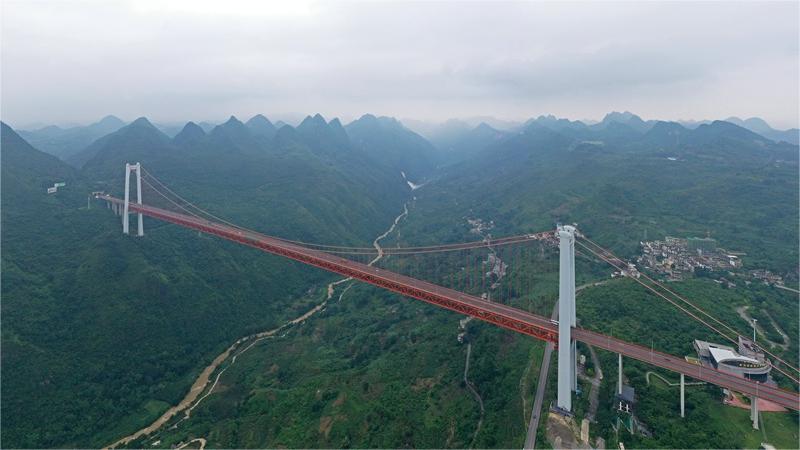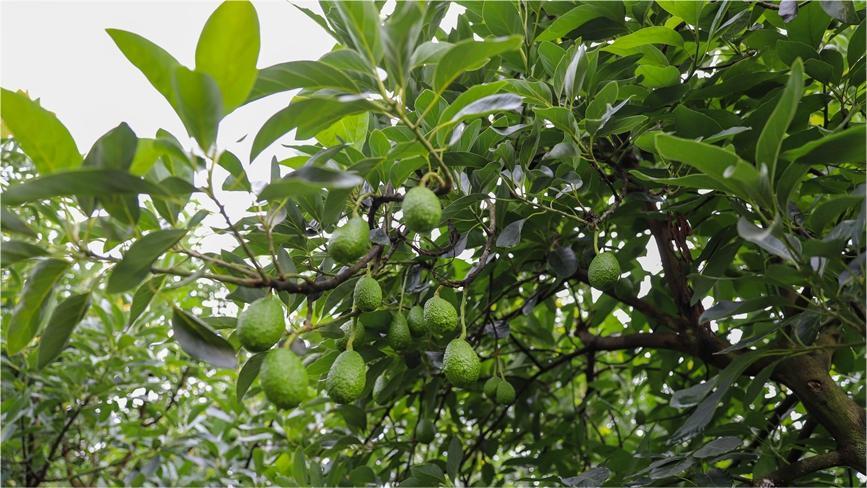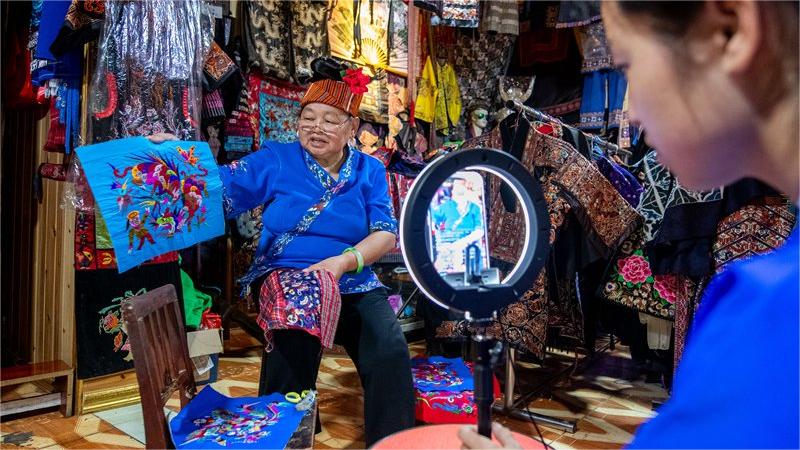China, Kazakhstan launch new connectivity projects to boost bilateral, regional cooperation

In this combo photo, Chinese President Xi Jinping and Kazakh President Kassym-Jomart Tokayev jointly attend an opening ceremony of the Trans-Caspian international transportation route via video link at the presidential palace in Astana, Kazakhstan, July 3, 2024. (Xinhua/Yin Bogu, Zhai Jianlan)
ASTANA, July 4 (Xinhua) -- In a major step aimed at bolstering connectivity and cooperation, visiting Chinese President Xi Jinping and Kazakh President Kassym-Jomart Tokayev on Wednesday attended the opening ceremonies of one transportation project and several cultural exchange facilities.
These projects, poised to enhance both bilateral and regional connectivity, highlight the two countries' commitment to strengthening ties, and evoke the region's illustrious history as a crossroads of trade and culture.
NEW ROAD TRANSPORT ROUTE FOR ENHANCED CONNECTIVITY
According to an estimation by the World Economic Forum, 90 percent of global traded goods are shipped by ocean. Land-locked countries, however, do not have the opportunities for this cheaper form of trade.
As the largest land-locked country in the world, Kazakhstan has transcended its geographical limitation through extensive development of its transportation network. A crucial aspect of this transformation into a "land-linked" country is its Belt and Road cooperation with China.
On Wednesday, the two heads of state presided over the opening ceremony of a road transport route to a Caspian Sea port via video link, bolstering Kazakhstan's efforts to improve its connectivity.
Though named "sea," the Caspian Sea is the world's larges inland body of water, surrounded by Kazakhstan, Russia, Turkmenistan, Iran, and Azerbaijan. Over the past few years, Kazakhstan has been modernizing its ports, crucial components of the Trans-Caspian International Transport Route (TITR).
The TITR begins at China's port of Lianyungang and runs through Kazakhstan, the Caspian Sea, Azerbaijan, Georgia, and on to European countries. Gaidar Abdikerimov, secretary-general of the TITR International Association, noted that the route has become a vital artery for transporting goods from Southeast Asia and China to Europe.
Before the debut of Chinese trucks utilizing a road transport route to reach the Caspian Sea on Wednesday, China-Europe freight trains originating from China and crossing the Caspian Sea had already maintained seamless operations for two years.
Now, a comprehensive, multi-dimensional network integrating road, rail, air, and pipeline transportation has been established.
Noting that it was in Kazakhstan in September 2013 that Xi first proposed the initiative of the Silk Road Economic Belt, an essential component of the Belt and Road Initiative (BRI), Abdikerimov said that "this strongly inspired us and we are a significant part of the BRI."
After more than a decade of development, the BRI has proven its feasibility and significantly impacted the development of the TITR, he said.
INCREASED CULTURAL EXCHANGE FACILITIES FOR BETTER TIES
In parallel with infrastructure developments, China and Kazakhstan on Wednesday enhanced "soft connectivity" through new cultural and educational projects.
Apart from attending the opening ceremony of the Chinese Culture Center in Astana and the Kazakh Culture Center in Beijing, the two heads of state also unveiled here the Kazakhstan Branch of Beijing Language and Culture University (BLCU).
Noting that Tokayev studied Chinese at BLCU from 1983 to 1984, BLCU's President Duan Peng called the Kazakh leader "a brand ambassador for Chinese language and culture education at BLCU."
Last October, when Tokayev visited his Chinese alma mater, he once again expressed his "sincere love for the Chinese people," said Duan, adding that it was during that visit, Tokayev endorsed the proposal to establish a branch of the university in Kazakhstan.
According to Duan, the Kazakhstan branch will welcome its first cohort of 100 students this September, and the new branch plans to expand to a capacity of 800 students over the next five years, serving the entire Central Asia region.
Interest in the new school has been high, with numerous inquiries pouring in. For these new students, who will be Tokayev's "new alumni," Duan had this message: "We look forward to your successful studies here, making good friends, learning the Chinese language and culture well, and becoming bridges for the exchange and mutual learning between civilizations."
Given the extensive shared border and the deepening partnership between China and Kazakhstan, particularly in transportation and logistics, there is a rapidly increasing demand in Kazakhstan for professionals proficient in Chinese, said Irsaliev Serik Aztaevich, president of Astana International University, where the BLCU Kazakhstan branch is located.
The new branch will focus on training high-level Kazakh-Chinese interpreters, with plans to expand its scope to train multilingual translators for the entire Central Asian region, he said, adding that Kazakhstan's demand for highly skilled professionals fluent in Chinese is growing swiftly.
Emphasizing that young people are the inheritors of China-Kazakhstan friendship from generation to generation, Xi, in his meeting with Tokayev on Wednesday, called for the two countries to give full play to the role of the culture centers and the Kazakhstan Branch of BLCU.
He urged these institutions to strengthen cultural exchanges, enhance mutual understanding between the two peoples, especially the young generation, and strengthen public support for all-round cooperation between the two countries.
CHINA'S COMMITMENT TO REGIONAL CONNECTIVITY
Xi arrived in Kazakhstan on Tuesday for a state visit and to attend the 24th Meeting of the Council of Heads of State of the Shanghai Cooperation Organization (SCO).
"President Xi's visit to Astana for the SCO summit is of significant importance and influence, because it underscores China's commitment to regional cooperation," said Gulnar Shaimergenova, director of Kazakhstan's China Studies Center.
"It (The visit) enhances diplomatic ties, promotes economic cooperation, and strengthens the unity and effectiveness of the SCO," she said.
"President Xi's presence at the summit highlights China's vision for a more interconnected and prosperous region," Shaimergenova concluded.
China's commitment to enhancing connectivity extends beyond its bilateral relations with Kazakhstan. Under the BRI, China is spearheading numerous infrastructure projects across Central Asia for win-win cooperation and common prosperity across the region.
A prime example is the agreement on constructing the China-Kyrgyzstan-Uzbekistan railway, reached in early June. Once completed, this railway will significantly shorten the time required to transport Central Asian products to major global markets. It will also facilitate the integration of Central Asia into global industrial and supply chains, thereby boosting regional development.

Chinese President Xi Jinping and Kazakh President Kassym-Jomart Tokayev jointly unveil the nameplates of Astana China culture center, Beijing Kazakhstan culture center, and the Kazakhstan Branch of Beijing Language and Culture University, at the presidential palace in Astana, Kazakhstan, July 3, 2024. (Xinhua/Pang Xinglei)
Photos
Related Stories
Copyright © 2024 People's Daily Online. All Rights Reserved.









